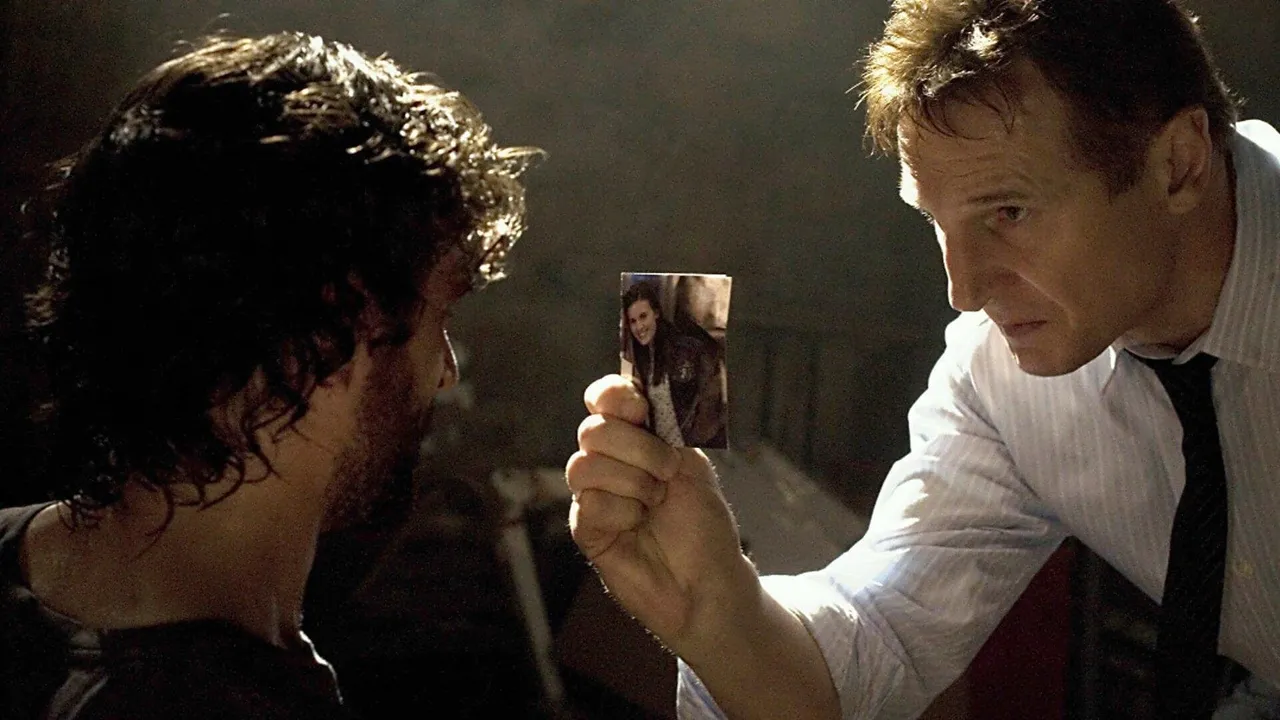
Liam Neeson stands as a modern embodiment of what Lee Marvin, Charles Bronson, and Clint Eastwood used to be during the golden age of Hollywood action cinema - iconic actors specialised in portraying tough, no-nonsense characters who, while not conventionally handsome or articulate, were desirable to be around when things would start to go bad. Neeson has established this reputation with his portrayal of Bryan Mills in the 2008 film Taken, which not only became his most iconic but also significantly influenced the trajectory of his career, for better or worse.
Bryan Mills is introduced in film as a former Green Beret and retired CIA officer whose dedication to his career has cost him his family life. His ex-wife Lenore (played by Famke Janssen) has remarried a wealthy man, Stuart St John (played by Xander Berkeley), leaving Bryan estranged from his daughter Kim (played by Maggie Grace). Despite the familial discord, Bryan's devotion to Kim is unwavering. When she and her friend Amanda (played by Katie Cassidy) travel to Paris, he warns her to exercise caution, a sentiment dismissed by those around him as overprotective paranoia. Tragically, Bryan's fears materialise when both girls are abducted. Without hesitation, he travels to Paris and employs his extensive skills and connections to track down the Albanian gang responsible for their kidnapping. He uncovers a disturbing network engaged in sex trafficking, where young girls are sold into slavery for the gratification of wealthy clients worldwide.
Taken is produced by Luc Besson, a French filmmaker who became as favourite of arthouse snobs only to later try “outHollywooding” Hollywood with his specific brand of action and genre cinema. He developed the film around single concept—an anguished father determined to rescue his daughter—which is straightforward yet powerful. What distinguishes Taken is its relentless pursuit of this simple narrative; Bryan Mills is so singularly focused on his mission that considerations of legality and morality become secondary. Throughout his quest, Bryan not only breaks numerous laws but also resorts to torture and killing of anyone who stands in his way. This portrayal of vigilante justice evokes the ethos of 1970s and 1980s action films, where protagonists often operated outside the law in their quest for retribution.
However, the script co-written by Besson and Robert Mark Kamen introduces an intriguing nuance before the chaos ensues: Bryan attempts diplomacy. During an unexpected phone call with Kim’s kidnapper (played by Arben Barjaktaraj), he proposes a peaceful compromise whereby the kidnapper would be left alone in exchange for Kim’s release. This moment raises ethical questions about accountability and justice; accepting such an arrangement would allow the villain to evade punishment for his crimes and potentially continue his nefarious activities. Yet, the film does not dwell on these moral complexities; instead, it positions Bryan as the unequivocal hero when the kidnapper predictably rejects his offer, further galvanising audience support for his violent crusade against sex traffickers. This pivotal conversation has since become the film's most memorable scene and has later inspired countless internet memes in a way only few other 21st Century films did.
The effectiveness of this scene—and indeed the entire film—can be attributed to Pierre Morel's direction. A former cinematographer who has shown his propensity for action genre with 2004 directorial debut District 13, Morel expertly balances pacing with character development and thrilling action sequences. Morel's adeptness compensates for certain script shortcomings, such as some characters' one-dimensionality and subplots that feel extraneous—like Kim’s aspirations to become a pop star under tutelage of singer played by Holly Valance, which seem somewhat superfluous against the backdrop of her abduction.
Interestingly, Neeson initially regarded the role of Bryan Mills with scepticism, fearing it would be just another forgettable direct-to-video film. Critics were generally dismissive of Taken, particularly given their usual disdain for action films and Besson's works. However, audiences embraced it wholeheartedly; Taken became a massive box office success that spawned sequels in 2012 and 2014 and even led to a television series featuring Clive Standen that aired for two seasons. Neeson transitioned from a primarily dramatic actor to one sought after for action roles akin to Mills.
Some critics have pointed out the film's reliance on cliches, with most of the villains being of Muslim or Middle Eastern origin. However, the theme of sex trafficking and the exploitation of young women is a pressing issue in today's world, as evidenced by the revelations about Epstein's Island and similar scandals. "Taken" may not be a perfect film, but it is a thrilling action movie that has left a lasting impact on the genre and Neeson's career.
RATING: 8/10 (+++)
Blog in Croatian https://draxblog.com
Blog in English https://draxreview.wordpress.com/
InLeo blog @drax.leo
Hiveonboard: https://hiveonboard.com?ref=drax
Rising Star game: https://www.risingstargame.com?referrer=drax
1Inch: https://1inch.exchange/#/r/0x83823d8CCB74F828148258BB4457642124b1328e
BTC donations: 1EWxiMiP6iiG9rger3NuUSd6HByaxQWafG
ETH donations: 0xB305F144323b99e6f8b1d66f5D7DE78B498C32A7
BCH donations: qpvxw0jax79lhmvlgcldkzpqanf03r9cjv8y6gtmk9